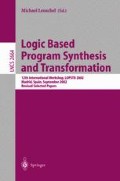Abstract
In this paper, we develop a bottom-up fixed point semantics for pure Prolog programs extended with !/0 that allows to reconstruct the operational semantics of a particular goal. Our semantics captures both the order in which solutions are computed by SLD-resolution and their multiplicity.
Access this chapter
Tax calculation will be finalised at checkout
Purchases are for personal use only
Preview
Unable to display preview. Download preview PDF.
References
K. R. Apt. Logic programming. In J. van Leeuwen, editor, Handbook of Theoretical Computer Science, Volume B, Formal Models and Semantics, pages 493–574. Elsevier Science Publishers B.V., 1990.
Roberto Barbuti, Michael Codish, Roberto Giacobazzi, and Giorgio Levi. Modelling Prolog control. Journal of Logic and Computation, 3(6):579–603, December 1993.
Roberto Barbuti, Roberto Giacobazzi, and Giorgio Levi. A General Framework for Semantics-Based Bottom-Up Abstract Interpretation of Logic Programs. ACM TOPLAS, 15(1):133–181, January 1993.
Marianne Baudinet. Proving termination of Prolog programs: A semantic approach. Journal of Logic Programming, 14(1 & 2):1–29, 1992.
A. Bossi, M. Gabbrielli, G. Levi, and M. Martelli. The s-semantics approach: Theory and applications. Journal of Logic Programming, 19/20:149–197, 1994.
A. Bossi, M. Gabbrielli, G. Levi, and M. C. Meo. A compositional semantics for logic programs. Theoretical Computer Science, 122(1–2):3–47, 1994.
M. Bugliesi and F. Russo. Partial evaluation in Prolog: Some improvements about cut. In Ewing L. Lusk and Ross A. Overbeek, editors, Proceedings of the North American Conference on Logic Programming, pages 645–660, Cleveland, Ohio, USA, 1989.
Baudouin Le Charlier, Sabina Rossi, and Pascal Van Hentenryck. Sequence-based abstract interpretation of Prolog. Theory and Practice of Logic Programming, 2(1):25–84, 2002.
M. Codish, D. Dams, and E. Yardeni. Bottom-Up Abstract Interpretation of Logic Programs. Theoretical Computer Science, 124(1):93–125, February 1994.
Marco Comini and Maria Chiara Meo. Compositionality properties of SLD-derivations. Theoretical Computer Science, 211(1 & 2):275–309, January 1999.
S. K. Debray and P. Mishra. Denotational and operational semantics for Prolog. Journal of Logic Programming, 5(1):61–91, 1988.
M. Falaschi, G. Levi, M. Martelli, and C. Palamidessi. Declarative modeling of the operational behaviour of logic programs. Theoretical Computer Science, 69:289–318, 1989.
G. Filè and S. Rossi. Static analysis of Prolog with cut. In A. Voronkov, editor, Proceedings of the 4th International Conference on Logic Programmng and Automated Reasoning, pages 134–145, 1993. Springer-Verlag.
N. D. Jones, C. K. Gomard, and P. Sestoft. Partial Evaluation and Automatic Program Generation. Prentice Hall, 1993.
M. Leuschel and D. De Schreye. Logic program specialisation: How to be more specific. In H. Kuchen and S. Swierstra, editors, Proceedings of the International Symposium on Programming H Languages, Implementations, Logics and Programs (PLILP’96), pages 137–151, Aachen, Germany, 1996. Springer-Verlag. LNCS 1140.
Michael Leuschel. Partial evaluation of the “real thing”. In Logic Program Synthesis and Transformation. Proceedings of LOPSTR’94, Pisa, Italy, 1994.
Michael Leuschel. Program specialisation and abstract interpretation reconciled. In Joxan Jaffar, editor, Proceedings of the Joint International Conference and Symposium on Logic Programming (JICSLP’98), pages 220–234, Manchester, UK, 1998. MIT Press.
J. W. Lloyd. Foundations of Logic Programming. Springer-Verlag, 1987.
K. Marriott, L. Naish, and J.-L. Lassez. Most specific logic programs. In Robert A. Kowalski and Kenneth A. Bowen, editors, Proceedings of the Fifth International Conference and Symposium on Logic Programming, pages 909–923, Seattle, 1988. ALP, IEEE, The MIT Press.
R. A. O’Keefe. On the treatment of cuts in Prolog source-level tools. In Proceedings of the International Symposium on Logic Programming, pages 68–72. IEEE Computer Society, Technical Committee on Computer Languages, The Computer Society Press, July 1985.
S. Prestwich. An unfold rule for full Prolog. In Kung-Kiu Lau and Tim Clement, editors, Proceedings of the International Workshop on Logic Program Synthesis and Transformation, Workshops in Computing, pages 199–213, London, July 2–3 1993. Springer Verlag.
M. Proietti and A. Pettorossi. Semantics preserving transformation rules for Prolog. In Proceedings of PEPM’91, Sigplan Notices, Vol. 26, N. 9, pages 274–284, 1991.
D. Sahlin. Mixtus: An automatic partial evaluator for full prolog. New Generation Computing, 12(1): 7–51, 1993.
F. Spoto. Operational and goal-independent denotational semantics for Prolog with cut. Journal of Logic Programming, 42(1):1–46, 2000.
Ashwin Srinivasan, Stephen Muggleton, Michael J. E. Sternberg, and Ross D. King. Theories for mutagenicity: A study in first-order and feature-based induction. Artificial Intelligence, 85(1–2):277–299, 1996.
M. H. van Emden and R. Kowalski. The Semantics of Predicate Logic as Programming Language. Journal of ACM, 23(4):733–743, 1976.
W. Vanhoof, D. De Schreye, and B. Martens. A framework for bottom up specialisation of logic programs. In C. Palamidessi, H. Glaser, and K. Meinke, editors, Proceedings of the Joint International Symposia PLILP/ALP 1998, volume 1490 of Lecture Notes In Computer Science, pages 54–72. Springer-Verlag, 1998.
W. Vanhoof, D. De Schreye, and B. Martens. Bottom-up partial deduction of logic programs. The Journal of Functional and Logic Programming, 1999:1–33, 1999.
Author information
Authors and Affiliations
Editor information
Editors and Affiliations
Rights and permissions
Copyright information
© 2003 Springer-Verlag Berlin Heidelberg
About this paper
Cite this paper
Vanhoof, W., Tronçon, R., Bruynooghe, M. (2003). A Fixed Point Semantics for Logic Programs Extended with Cuts. In: Leuschel, M. (eds) Logic Based Program Synthesis and Transformation. LOPSTR 2002. Lecture Notes in Computer Science, vol 2664. Springer, Berlin, Heidelberg. https://doi.org/10.1007/3-540-45013-0_18
Download citation
DOI: https://doi.org/10.1007/3-540-45013-0_18
Published:
Publisher Name: Springer, Berlin, Heidelberg
Print ISBN: 978-3-540-40438-5
Online ISBN: 978-3-540-45013-9
eBook Packages: Springer Book Archive

